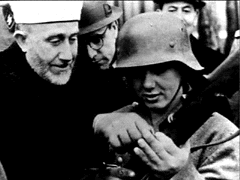Haj Amin al-Husseini
(1893-1974)
Appointed Mufti of Jerusalem by the British in 1921, Haj Amin al-Husseini was the most prominent Arab figure in Palestine during the Mandatory period. Al-Husseini was born in Jerusalem in 1893, and went on to serve in the Ottoman Army during World War I. Anti-British and anti-Jewish, the mufti was the key nationalist figure among Muslims in Palestine. Fearful that increased Jewish immigration to Palestine would damage Arab standing in the area, the mufti engineered the bloody riots against Jewish settlement in 1929 and 1936.
Al-Husseini's appointment as mufti was itself the subject of much controversy. The decision to grant al-Husseini the position was made by Herbert Samuel, the first high commissioner of Palestine. It was odd that Samuel, a British Jew, would appoint a man who would be responsible for so much unrest within the Mandatory area. Al-Husseini in fact had been sentenced to ten years in prison by the British for inciting riots in 1920. None of that sentence was served, as al-Husseini had fled to Transjordan, and was soon after amnestied by Samuel himself.
For his part, al-Husseini had used his influence to quiet additional disturbances in 1921. He assured Samuel that he would continue to maintain order, and it was with this understanding that the high commissioner granted him the position of mufti. In the following year, he was also appointed to lead the Supreme Muslim Council, expanding his already significant powers. Known later as the Grand Mufti, al-Husseini was able to establish himself as the preeminent Arab power in Palestine.
One of the mufti's most successful projects was the restoration of the Dome of the Rock and the al-Aqsa mosque. With funds collected from India and various Arab states, the Dome was plated in gold. The impressive looks of the Dome greatly enhanced the status of Jerusalem in the eyes of Muslims throughout the world. Similarly, al-Husseini's own status as Mufti of Jerusalem increased his standing as an influential Arab leader.
The mufti was dismissed from his position following the riots of 1936. No longer able to stay in Palestine, he continued his extremist activities from abroad. During World War II, the mufti was involved in the mobilization of support for Germany among Muslims. In November 1941 the Mufti met with Hitler. Although he continued to be involved in politics, al-Husseini's influence gradually declined after the defeat of the Arab armies in 1948.




